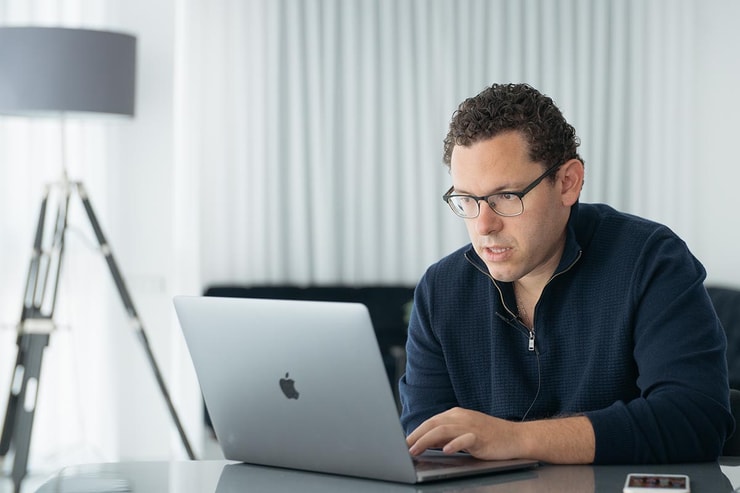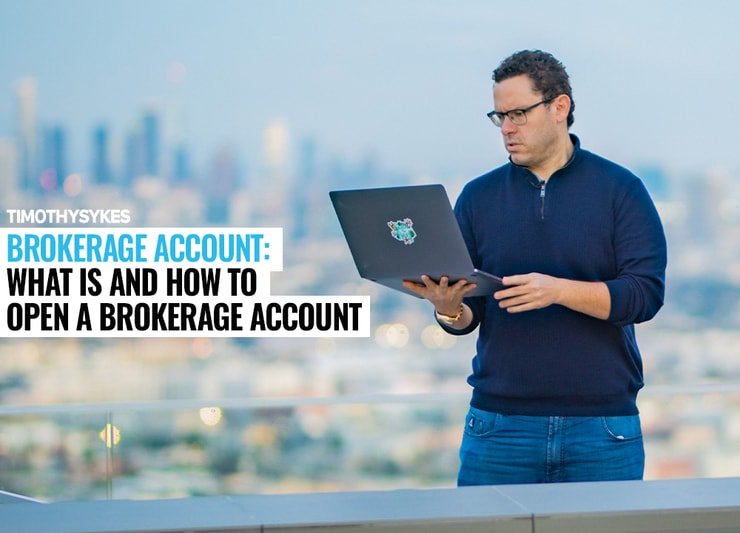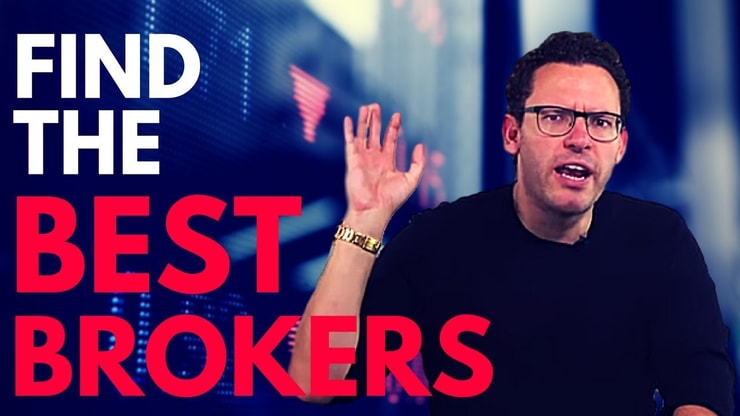You probably know that you need a brokerage account if you want to trade stocks and other securities . But what is a brokerage account? And why do you need one?
Stock brokers are like real-estate agents. They know all the rules regarding trading, how to execute trades, and what the SEC requires. Consequently, they’re qualified to make trades on the stock market, whereas people like you and me are not.
Many stock brokers work for large brokerage houses or agencies. Others work for individuals or on Wall Street, but those professionals are beyond the scope of this article.
What I’ll focus on here is opening and managing a brokerage account if you decide you want to trade stocks.
Table of Contents
What is Brokerage Account?

A brokerage account is kind of like any other bank account: it’s typically a secure place to deposit funds.
Instead of being managed by a bank, however, it’s kept secure by a broker or brokerage firm.
Investors have contracts with brokers to deposit funds and use those funds for stock trading purposes.
I often talk about one form of brokerage account on this website, which I also refer to as a trading account. It’s the type of account where you make your own trades online based on your research, technical analysis, and other research.
However, other brokerage account types exist. For instance, a full-service brokerage account often involves personal advice as well as trading advice. They also trade for you.
There are also lots of brokerage accounts in between. You can decide what level of service you want.
For example: Maybe you’re uncomfortable making your own trades, but YOU want to decide which trades to make. In this case, you can set up a brokerage account where you can call your broker and tell him or her what to do on your behalf.
Brokerage Account Number
Just like bank accounts, brokerage accounts have numbers associated with them. They identify which account belongs to you.
Some brokerage accounts even work like bank accounts. For example: You can write checks on them, or even use a linked debit card. In this case, the account number will accompany a routing number.
You’ll need your brokerage account number to access your information online and to verify your identity if you need to call your broker. Don’t share it with anyone.
Benefits of Setting Up a Stock Trading Account
When you have a stock trading account, you can execute trades — buy, sell, short, trade options, whatever you want to do — when you find a play you believe will be profitable. It’s how I trade. In fact, I use multiple regular trading accounts as well as a high-net-worth broker.
You can’t trade stocks without a broker. That’s simply the bottom line. Unless you’re a broker, you need a brokerage account to invest or trade.
If you’ve followed my career, then you know I’m passionate about the stock market and about teaching others to trade. I value my brokerage accounts tremendously because they allow me to earn an excellent living doing what I love.
Even if you’re not quite ready to trade, setting up a stock trading account can put you in a position to trade when you’re ready. Since many online brokers (like E*Trade, for instance) allow you to open an account without a minimum deposit, this can also give you a chance to fund your account.
For example: Let’s say you set aside $20 per week for your trading account. After 52 weeks, you could have an account funded with over $1,000.
More Breaking News
- Guardant Health: Unraveling the Surprisingly Flourishing Revenue Trajectory
- Growth or Bubble? Dissecting the Surge of Centrus Energy Corp.
- TeraWulf Inc. Shares Plummet Amid Security Filing and Crypto Drop: Time to Invest or Cut Losses?
How to Open a Brokerage Account
In most cases, traders can open brokerage accounts in minutes by filling out an online application.
Let’s use E*Trade as our example again: If you open an account with E*Trade, they’ll ask you what type you want. You select Brokerage. Then you decide whether you want to open it by yourself, jointly with someone else, as a custodian, or in some other manner. Many traders open solo accounts, or joint accounts with their spouses.
Then you’ll fill out some basic information: your name, address, phone number, and so on.
The next screen will ask for some personal information about you, like your date of birth, social security number, marital status, how many dependents you have, what you do for a living, your annual income, your liquid net worth, and total net worth.
That sounds like a lot of information, but your broker uses it to set up your account properly and make sure you’re a good candidate for the account — so make sure you’re honest and accurate.
You’ll then be asked to fill out your investment profile. E*Trade wants to know your trading goals, investment experience, and your level of options investment knowledge. Additionally, you’ll tell E*Trade how you plan to fund your account.
From there, it’s simply a matter of funding the account and getting used to the system.
How to Choose a Brokerage Account
I mentioned E*Trade, but there are lots of brokerage account options out there. I’ve had good experiences with TD Ameritrade and Interactive Brokers.
You want a broker with good customer service, plenty of assets, and a history of meeting customers’ expectations. Avoid joining up with brand-new brokerage firms if you don’t have a specific reason for doing so. Aim for a broker with a track record.
Type of Brokerage Account
Every broker handles fees and requirements differently. There aren’t any overall industry standards, necessarily, except what’s required by the Securities Exchange Commission.
Brokerage Account Fees, Costs and Incentives
Lots of companies (including our example, E*Trade) offer incentives to get traders to join. These incentives might include access to market news and data, commission-free trades when accounts are opened with certain minimum deposits, and more.
Traders typically have to pay fees in exchange for using the broker. For example: Brokerage accounts can have maintenance costs, which are annual or monthly fees traders pay for keeping their accounts open. Traders will also need to pay for trades, whether per trade (no matter the position) or per share (which I typically don’t recommend).
Services Offered
Lots of brokers offer extra services. Some provide free investment advice, such as a 30-minute phone call with a professional advisor. Others have trading platforms where traders can paper trade, check Level I and Level II quotes, and more.
Commission Fee Basis
Most brokerage firms charge a commission fee for every trade you make. Currently, the average tends to hover at just under $7 per trade.
It doesn’t matter if you trade 10 shares or 5,000 shares — you usually pay the same fee as long as you make the trade at the same time.
In other words, if, for example, you buy 5,000 shares of a stock in two 2,500-share transactions, you’ll probably pay the commission fee twice.
Advisory Fee Basis
If you want your financial advisor to make trading decisions for you, you’ll often pay far more in fees.
I’m not a fan of this route because you don’t actually learn how to execute trades yourself. Instead, you listen to someone tell you what to do — someone who might have an ulterior motive for his or her recommendations.
Investment Selection
You might also consider choosing a brokerage firm based on the types of investments they allow. Most brokerage firms offer multiple securities, from stocks and bonds to mutual funds, FOREX, and ETFs.
How Often You Plan to Trade
Consider, as well, how often you intend to trade securities. For example: Some brokerage firms require you to make a certain number of trades every month.
Minimums
There are a few situations in which you might have to deposit funds into your account to meet minimum requirements set by your brokerage firm.
Some firms require minimum initial deposits, which means they require you to deposit a certain amount of money (for example: $10,000 or $20,000) in your account before you can even begin trading. If you’re new to the stock market and you don’t want to fund your account with that much money, then perhaps consider a firm with no minimum deposit required.
You might also have to maintain a minimum balance to keep your account active. This is common when you’re trading on margin (something in which I’m not interested) and your position puts you in a situation where your broker makes a margin call. In other words, you must deposit sufficient funds into your account to support the margin you’ve borrowed from your broker.
Explore Investing Options
You might already know that I trade penny stocks. It’s my bread and butter, and it’s how I made myself into a millionaire**. However, there are many other investment opportunities, and I’ve diversified over the years and tried out different types of investments.
Three of the most common investment options include index funds, mutual funds, and ETFs.
Index Funds
An index fund is a stock market fund that’s based on a specific index, such as the S&P 500. It demands passive fund management, which means it’s a fairly simple choice for new investors, and often carries low risk. So if you’re a conservative investor, index funds can be a wise choice.
Mutual Funds
A mutual fund, just as the name suggests, is an investment vehicle that pools money from multiple investors. There’s a manager who decides how to invest that money for maximum gains and minimum risks. This is another fairly low-risk option for investors.
ETFs
Exchange-traded funds, or ETFs, are very similar to index funds and mutual funds except that they’re traded on an exchange just like a stock. They’re more liquid than mutual funds, which means that they can sometimes offer greater rewards, but rapid price fluctuations also introduce more risk.
How Much Does it Cost to Open a Brokerage Account?

In most cases, it won’t cost you anything to open a brokerage account.
If you’re using one of the common online brokers, you can usually get your account set up with no minimum deposit. However, if you want to trade, you’ll have to fund the account.
The fees come into play when you trade. The brokerage account doesn’t let you use its services for free; it expects to make money on each trade you make. Think of it as the cost of doing business.
Brokerage Account Comparison: What Are Some Top Brokerage Accounts?
I don’t often give my opinion on specific brokerage accounts, but I’ve used several with great success. I mentioned them earlier in this article: E*Trade, TD Ameritrade, and Interactive Brokers.
However, if you’re new to the stock market, or if you want more market data and information than these brokers provide, you might want to use a trading platform, as well.
StocksToTrade
StocksToTrade is a trading platform that provides you with all the information you need to know to help you trade.
You can paper trade if you’re a beginner and not ready to put your money behind your positions. Plus, you can access endless amounts of stock charts, check out the latest news, and create watchlists.
Tips on Opening a Brokerage Account
Before you open a brokerage account, ask yourself if you’re really ready to trade. There’s no time like the present, but you need knowledge and research under your belt.
Too many new traders just start buying and selling securities with no real rhyme or reason. They can flame out fast — trust me, I’ve seen it. If you think you can avoid that and open a trading account, go for it.
Look for a Brokerage Account with Low Fees or No Fees
It’s ideal to pay as little as possible to trade stocks.
There are actually free brokerage firms, such as Robinhood, but you should remember that you get what you pay for. Free brokerage firms limit what you can do and how much money you can invest.
Pay Attention To Customer Service
The stock market moves fast, especially when you’re trading small-cap stocks like me. It’s important to make trades at the drop of a hat to help capitalize on good positions.
That’s why good customer service is paramount when it comes to choosing a brokerage account. Make sure the company you choose one will be responsive when you have questions or experience technical difficulties with your account.
The Bottom Line
Do you need a brokerage account? If you want to trade stocks, absolutely. There’s no way around it.
I’ve been trading penny stocks and other securities for years, and I always have multiple trading accounts open. They allow me to be as flexible as possible when it comes to making decisions about potential investments.
If you’re new to the game, consider getting started with StocksToTrade. Apply to join my Trading Challenge to help you learn from top traders, then, if you’re ready, you can open your own trading account after you’ve successfully practiced paper trading.
You’ll thank yourself later.



Leave a reply